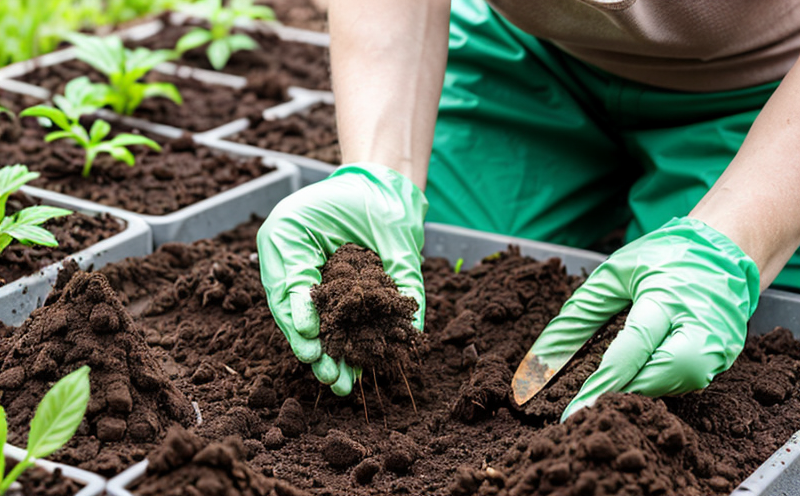ASTM D6400 Compostability Testing of Outdoor Plastic Materials
The ASTM D6400 standard is a pivotal guideline for determining whether plastic materials can biodegrade in industrial composting environments. This service focuses specifically on the compostability testing of outdoor plastics, which are increasingly used in applications such as mulch films, plant pots, and landscape edging.
Outdoor plastics face unique challenges due to their exposure to elements like sunlight, moisture, temperature fluctuations, and biodegradation by microorganisms. The ASTM D6400 test ensures that these materials meet stringent criteria for compostability in industrial composting facilities, thereby minimizing environmental impact.
The testing process involves several key steps: specimen preparation, incubation under controlled conditions, observation of decomposition rates, and measurement of biodegradation levels. Specimens are typically exposed to specific temperatures and humidity levels that mimic industrial composting environments. This ensures accurate assessment of the material's ability to break down into water, carbon dioxide, and biomass within a defined period.
The ASTM D6400 test is crucial for outdoor plastics because it guarantees that these materials do not contaminate natural soil or water systems when they decompose in industrial composting. The standard specifies the use of a specific type of soil inoculum derived from European waste streams, which helps simulate realistic conditions found in industrial composting facilities.
For R&D engineers and quality managers, understanding the nuances of ASTM D6400 is essential to ensure that outdoor plastic materials meet regulatory requirements and environmental standards. Compliance officers can leverage this testing to verify that products comply with international guidelines such as ISO 17549 for biodegradable plastics.
The test results provide critical insights into the biodegradation potential of outdoor plastics, enabling manufacturers to optimize their formulations and processes. This not only enhances product performance but also contributes significantly to sustainable practices in the horticultural and landscaping industries.
By adhering to ASTM D6400 standards, businesses can ensure that their outdoor plastic products contribute positively to environmental conservation efforts. The test results are widely recognized by regulatory bodies and industry stakeholders, ensuring a smooth compliance process.
Quality and Reliability Assurance
The quality assurance processes in ASTM D6400 compostability testing are rigorous and meticulously designed to ensure reliability. Our laboratory employs state-of-the-art equipment, trained technicians, and strict adherence to international standards.
We begin by selecting appropriate specimens that represent the outdoor plastic materials to be tested. Specimen preparation is critical; it must accurately reflect real-world conditions to yield reliable results. Our lab uses precise cutting techniques and standardized sample sizes to ensure consistency.
The specimens are then incubated under controlled environmental conditions, closely mimicking industrial composting environments. This includes maintaining specific temperature, humidity, and oxygen levels throughout the test period. The use of advanced monitoring systems allows us to track decomposition rates accurately, ensuring that any deviations from expected results can be promptly addressed.
Our technicians perform regular checks on the specimens, recording observations on weight loss, color changes, and other relevant parameters. These data points are essential for assessing biodegradation levels and determining compliance with ASTM D6400 standards.
The final step involves detailed reporting based on the collected data. Our reports provide comprehensive insights into the compostability of outdoor plastic materials, including decomposition rates, biodegradation percentages, and any other relevant findings. These reports are meticulously reviewed by our experts to ensure accuracy and reliability before being delivered to clients.
We also offer additional services such as accelerated aging tests to simulate long-term exposure to environmental factors. This ensures that the compostability of outdoor plastic materials is assessed comprehensively, providing a robust quality assurance framework.
Customer Impact and Satisfaction
The ASTM D6400 compostability testing service has a profound impact on our customers by enhancing the sustainability credentials of their products. For quality managers, this means having reliable data to support product claims and ensure compliance with international standards.
R&D engineers benefit from detailed insights into material performance under real-world conditions, enabling them to innovate and optimize formulations for better environmental compatibility. Compliance officers find it easier to navigate regulatory requirements knowing that their products meet stringent compostability criteria.
Our customers appreciate the transparency and reliability of our testing process. By providing accurate and consistent results, we help them build trust with their stakeholders and end-users. This is particularly important in a market where consumer demand for sustainable products continues to grow.
We also offer personalized support to ensure that all aspects of the testing process are clear and straightforward for our customers. Our team works closely with clients to understand their specific needs and requirements, tailoring each service to meet those expectations.
Customer satisfaction is at the heart of what we do. By delivering high-quality, reliable results in a timely manner, we ensure that our customers are confident in their product offerings. This builds long-term relationships based on trust and mutual respect.
International Acceptance and Recognition
The ASTM D6400 compostability testing service is widely recognized and accepted internationally, making it a preferred choice for businesses operating in global markets. The standard has been adopted by numerous countries and organizations, ensuring consistent quality across different regions.
Our laboratory adheres strictly to the requirements outlined in ISO 17549-2:2016, which provides supplementary guidance on biodegradable plastics. This alignment with international standards ensures that our test results are accepted globally, simplifying compliance processes for our customers.
The ASTM D6400 standard is particularly relevant for industries such as horticulture and landscaping, where outdoor plastic materials play a crucial role in sustainable practices. By meeting these standards, businesses can confidently market their products as environmentally friendly, thereby enhancing their competitive edge.
Our commitment to international recognition extends beyond compliance with ASTM D6400. We also participate in collaborative projects with leading research institutions and industry leaders to stay at the forefront of advancements in compostable materials. This continuous engagement ensures that our testing capabilities remain state-of-the-art, meeting the evolving needs of our customers.





